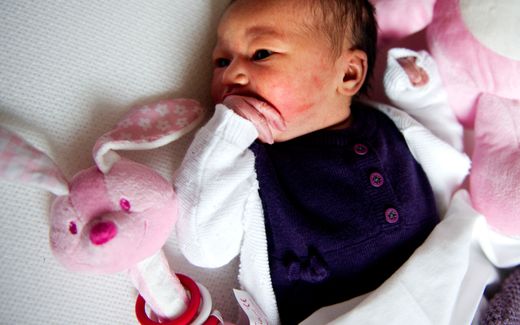Family almost out of the picture in "Rutte-4"
18-12-2021
Western Europe
Henk Jan van Schothorst and Jan Schippers

Families come at the end in the coalition plan for the new Rutte government. Photo ANP, Vincent Jannink
Western Europe
This week in the Netherlands, the coalition agreement of the new to come Rutte-4 cabinet was presented. Four parties, two liberal (VVD and D66) and two Christian (CDA and CU), support this agreement.
The document’s title reads, “Looking after each other; looking forward to the future.” But unfortunately, the document mainly has a liberal and individualistic tone. The family gets hardly any attention and stands at the back of the queue. The last sentence is illustrative. It’s a promise for a targeted reduction in taxes for low- and middle-income earners, for working people and families. In that order.
Many plans and measures have yet to be worked out into a concrete proposal for legislation. That makes it a bit difficult to assess precisely the impact on families. But the direction is clear. When it comes to families, further undermining by ‘Rutte-4’ can be expected. The emphasis is on individual autonomy, combating discrimination and promoting labour participation.
Individuals instead of families first
The coalition agreement presented this week refers explicitly to the so-called Rainbow Agreement that three of the four coalition parties signed before the elections in March of this year. According to this Rainbow Agreement, the interests of the individual are, by definition, placed above those of the community. Whereas it is customary to weigh the different interests in each situation carefully.
This already pre-empts the idea that individual freedom takes precedence over the identity of a community or organisation. This puts pressure on ‘watching after for each other’, not to mention important classical fundamental rights such as freedom of association, freedom of religion and freedom of conscience.
After all, identity is not only a matter of free individual choice, since identity is (by definition) connected to your past, the family you grew up in, the place you live in, and so on. The uniqueness of identity is precisely the fact that you experience it and give it substance together with others. And you also develop it further together with others.
Identity is not a static given, but it changes gradually based on a shared past, philosophy of life, belief, source of inspiration and vision of the future. We, therefore, advocate a respectful interaction of individuals and community, in which freedom and responsibility go hand in hand.
Childcare allowance
One issue that has been causing a stir in Dutch politics recently is the childcare allowance affair. This complicated scheme was abused, and strict measures were taken to tackle the problem. Too strict because many parents who did not comply with all the accountability requirements had to pay back the money they had received. As a result, they got into financial difficulties.
The new cabinet plans to simplify the regulation significantly by not paying out the subsidy to the parents but to the childcare institution itself. The parents have to contribute only 5 per cent. This meets with several objections. First of all, because it puts lower incomes at a disadvantage compared to higher incomes with more financial capacity. A more considerable objection is that a generous 95 per cent subsidy is hardly effective. It is not expected to lead to much higher labour participation. Many women in the Netherlands like to (largely) take care of their children themselves or prefer to solve this informally, i.e. within the family circle. The scheme costs over 2 billion euros yearly.
Households that do not (or do not wish to) use childcare facilities must even pay for them through taxation. This is contrary to the profit principle. Moreover, it is short term politics. We all know that relatively few children are born in the Netherlands. For instance, in 2019, an average of only 1.6 children per woman. That is far too low to have sufficient future personnel available, for example, care and education. And to have enough taxpayers at all. Therefore, the system that this coalition wants to introduce is not future-proof and certainly does not bear witness to foresight. On this point, the Netherlands would do better to consult countries such as France and Germany.
Hungary: an inspiring example?
Even better, the Netherlands should take an example from Hungary. In the person of Katalin Novák, they have an excellent minister for families. The Hungarian government supports families in having children. Having more children means paying less tax per capita in the future. To encourage pregnancies, there is a subsidy of 30,000 euros. Mothers with four children do not have to pay taxes for the rest of their lives and waive any study debts.
Because the traditional, biological and Christian view on marriage, family and life has come under heavy pressure in Europe. Hungary has enshrined in the constitution that the father is a man and the mother is a woman. Marriage is a bond between one man and one woman. While everywhere in European countries the number of marriages is declining, it has increased by 25 per cent in recent years in Hungary. The number of divorces decreases, perhaps partly because otherwise previously waived loans have to be paid back.
Hungary has a population of 9.8 million, almost 1 million less than 40 years ago. This year the government puts €7.25 billion into supporting families, with €10 billion earmarked for 2022, over 6 per cent of the gross national product. By the way, the Dutch government pays only 1.8 per cent of gross national income to schemes that financially support families.
Hungary recently passed a law respecting parents as first responsible for teaching sexuality to children under 18. Schools are not allowed to promote homosexuality and sex change. The unauthorised frontal attack by EU leaders on this policy, with Prime Minister Rutte in the lead, went beyond all limits. We support this exemplary Hungarian family policy and have handed this courageous minister a Certificate of Appreciation.
Surrogacy
Another point of principle concern is the pursuit of “a good regulation for surrogacy”. It is a mystery to us what this liberal & Christian coalition means by “good regulation”. Commercial surrogacy should be prohibited, without question. But also, other voluntary forms of surrogacy are controversial because they are not compatible with the principle of human dignity. A child is not available on order. Surrogacy does not offer - to put it mildly - the best starting point for a child to grow up to be a stable adult. For that, it generally needs its own father and mother.
To conclude, we do not envy the position of the CDA and the ChristenUnie. Undoubtedly, the negotiators have done their best to get the best compromise possible with two bigger liberal parties. But the leading tone of the agreement is set by striving for an even stricter anti-discrimination policy to realise the ideal of equality for all people.

Liberal and left-wing parties want to liberate the individual even more radically by dissolving the community ties of family, school, neighbourhood, and church step by step. To this end, a diversity of family forms is recommended. There is also a risk that schools in the Netherlands cannot use teaching methods in which classical Christian morality is normative for living together.
Truth and subjective opinion
We live in times when truth degenerates into subjective opinion, and identity is a matter of individual agency. We will find out soon enough what this means for the freedom to orientate yourself entirely to Christ to be a true Christian.
Jan Schippers is director of the Scientific Department for the Dutch Reformed SGP party.
Henk Jan van Schothorst is executive director of Christian Council International.
Related Articles






